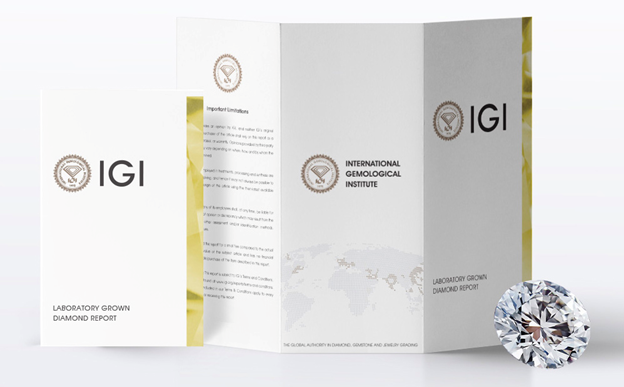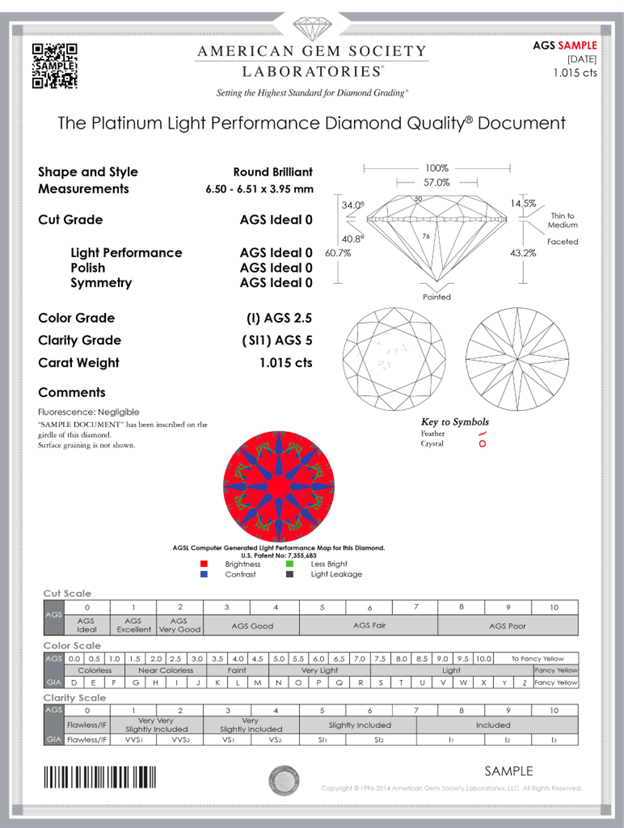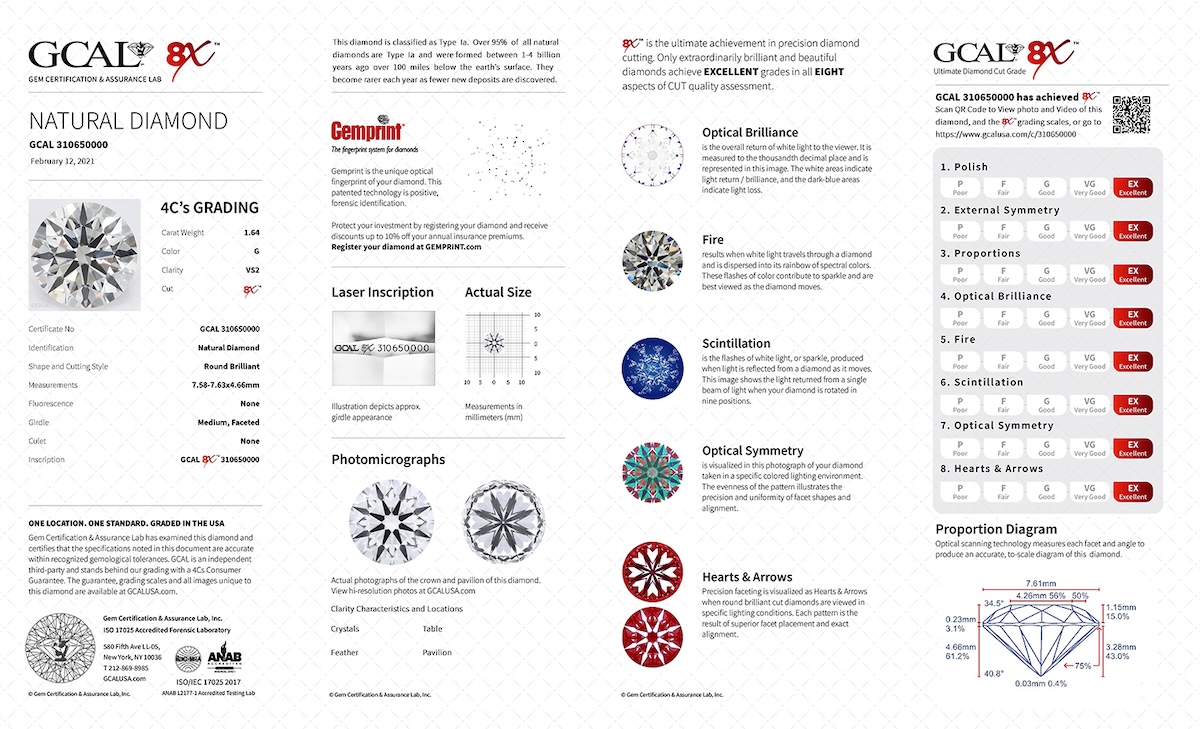This article has mentions of products from one or more companies, and I may receive compensation if you purchase those products following reading my recommendations.
Diamond certification is where gemstones have been graded by a reputable gem lab on the basis of their Four C attributes, which are Cut, Carat, Color, and Clarity. These diamonds have undergone quality analysis by a trusted gemological lab, such as GIA or AGS, and have been issued a lab report, which is commonly referred to as a “certificate” or “report”.
The most popular gem labs serve as an independent authority on the quality and identity of diamonds and are not directly involved in the transaction. Non-certified diamonds are pretty commonly available in the market and are simply those diamonds that have not gone through any kind of official lab grading.
A Short Guide to Diamond Certification

GIA Diamond Certificate
Diamond certifications provide reports to both buyers and sellers regarding the grades of each diamonds. Not only does this information prove the quality of the diamond, it also directly influences the price. Upon every purchase (or sale), the diamond certification should be reviewed, as this is the documentation that has been given by trained professionals using technical equipment.
Unfortunately, not all diamond certifications are equal. Some organizations have a history of inflating the quality of the diamonds they grade. Fortunately, they’re are organizations you can trust—the GIA, IGI for lab diamonds and GCAL.
What to Look for in Diamond Certification
The main thing you need to look for in diamond certification? Consistency.
In terms of consistency, the GIA are incredibly qualified and two of the most respected labs in the world.
For lab diamonds the IGI is the leading institute, consisting of 20 labs around the world, and 14 gemology schools.

IGI Diamond Certificate
They provide a wide variety of services including hearts and arrows grading and appraisal valuation.
GIA Certification
The Gemological Institute of America (GIA) is widely regarded as the gold standard in diamond certification, known for its uncompromising commitment to grading accuracy and consistency. Established in 1931, GIA is a nonprofit organization that has set the global benchmark for diamond grading with its strict standards and transparency. A GIA certification report provides detailed assessments of a diamond’s cut, color, clarity, and carat weight, offering an unbiased evaluation that is trusted across the jewelry industry. GIA reports are widely accepted and recognized for their reliability, ensuring that consumers receive accurate information when purchasing a diamond.
In October 2022, GIA acquired the American Gem Society Laboratories (AGSL), incorporating their well-regarded AGS Ideal reports into GIA’s services. These reports are known for their precision in grading the cut quality of diamonds, particularly the AGS "Ideal Cut" standard, which focuses on the light performance of a diamond. By offering AGS Ideal reports alongside their own, GIA now provides an even more detailed and stringent assessment of a diamond's cut, combining the strengths of both institutions. This acquisition further solidifies GIA’s position as the most respected authority in diamond certification, enhancing consumer confidence and expanding its range of high-quality grading services.
IGI Certification
The International Gemological Institute (IGI) is one of the largest and most recognized diamond certification laboratories globally, providing grading services for both natural and lab-grown diamonds. IGI is known for its wide accessibility, offering diamond reports that include assessments of a diamond’s cut, color, clarity, and carat weight. IGI’s grading system is similar to other major labs, but its reports tend to be seen as less stringent or reliable compared to those issued by the GIA and GCAL, particularly when it comes to natural diamonds.
IGI has gained popularity in recent years, especially with the rise of lab-grown diamonds, where their expertise and focus shine. They have become a leading lab for grading lab-grown stones, making their certification widely accepted for these diamonds. However, when it comes to natural diamonds, IGI reports may not be as specialized or reliable, with some critics suggesting that their grading can be more lenient than other labs. Therefore, I would only recommend IGI certification for lab-grown diamonds, where they excel, but not for natural diamonds, as other labs like GIA and GCAL provide more rigorous and trusted evaluations.
AGS Certification
The AGS is one of the longest-operating gem labs in the world, and previously had the monopoly on grading the best diamonds on the market. However, today, you will probably find that there are no discernible differences between the AGS and the GIA.

Learn more about the AGS and the GIA here.
GCAL Diamonds
Gem Certification & Assurance Lab (GCAL) is a highly respected diamond grading laboratory, known for its guaranteed grading accuracy and rigorous standards. GCAL certification offers consumers a detailed diamond analysis, including an 8X Cut Grade that evaluates eight critical aspects such as brilliance, fire, scintillation, symmetry, polish, girdle thickness, culet size, and craftsmanship. This thorough assessment ensures diamonds meet the highest quality benchmarks. Additionally, GCAL emphasizes light performance by using advanced imaging tools like ASET and IdealScope to provide a visual representation of a diamond's brilliance and sparkle.

A GCAL 8X diamond certification report for a natural diamond, detailing the 8X cut grade criteria. While it includes photomicrographs and laser inscriptions, it provides a thorough analysis of diamond quality and performance.
GCAL's reports are comprehensive, offering photomicrographs, laser inscriptions, and a unique GCAL Gemprint® for diamond identification. Their transparency and focus on consumer confidence make GCAL-certified diamonds a reliable option for those seeking top-quality stones.
Buying Certified Diamonds vs. Non-Certified Diamonds
Not all diamonds need to be graded by a gem lab. Lab reports on inexpensive or small diamonds offer insignificant benefits to the buyer while adding considerably to the cost (usually under 0.3 carats).
For diamonds of this size, however, make sure you are buying from a reputable dealer that certifies all their larger diamonds. The best online retailers that I would recommend are Whiteflash (for round and princess cut diamonds), James Allen (for fancy shapes) and Leibish and Co (for colored diamonds).
Where to Find the Best Diamonds Online
And the best place to start that research? Right here. I always give three recommendations when anyone asks me where to purchase diamonds online—Whiteflash, James Allen, and Blue Nile.
Head to my diamond review section to discover my exact thoughts on why these three diamond retailers are leading the online diamond market.
Diamond Certificate vs. Diamond Appraisal
Keep in mind that a diamond appraisal and diamond certification are not the same thing since there are some retailers who will attempt to pass off a diamond appraisal as a diamond certificate.
A diamond appraisal is usually prepared by the diamond seller to denote the approximated worth for the purpose of insurance. A diamond certificate, on the other hand, is a third-party, unbiased assessment of the gemstone’s quality arranged by a certified gem lab.
Additional Considerations Regarding Diamond Certification
Since practically any diamond can be sent to a laboratory for a grading report, the sheer fact that it is a certified diamond does not automatically mean that it is anything specifically special. The grading data contained in the report will act as proof of whether or not the diamond is commercial grade, gem grade, or a grade below.
Conversely, just because a diamond is not certified does not necessarily imply that it is somehow undesirable or of poor quality. Some diamond jewelers and dealers typically like to forgo the expenditure of a lab report to be able to sell the gem at an affordable rate—however, I would avoid them at all costs unless you are an expert.
This is particularly true with more commonplace commercial quality diamonds in medium to small sizes. High-quality diamonds in bigger sizes are often sent to the gem lab before they are even placed on the market.
Regardless of which diamond you may be considering, it is suggested that you only deal with a reputable diamond expert and on top of that only invest in certified diamonds.
Is Diamond Certification Important?
Diamond certification is potentially the most important thing during a purchase, only after the diamond itself. Without a trustworthy certificate, you cannot trust that the diamond you’re buying is exactly as described. When you’re looking for a specific diamond clarity, consult the certification. The same goes for color, carat weight, and cut.
My Final Recommendations
Do make sure you read my posts on GIA and AGS certification and the importance of how to read a diamond certificate.
